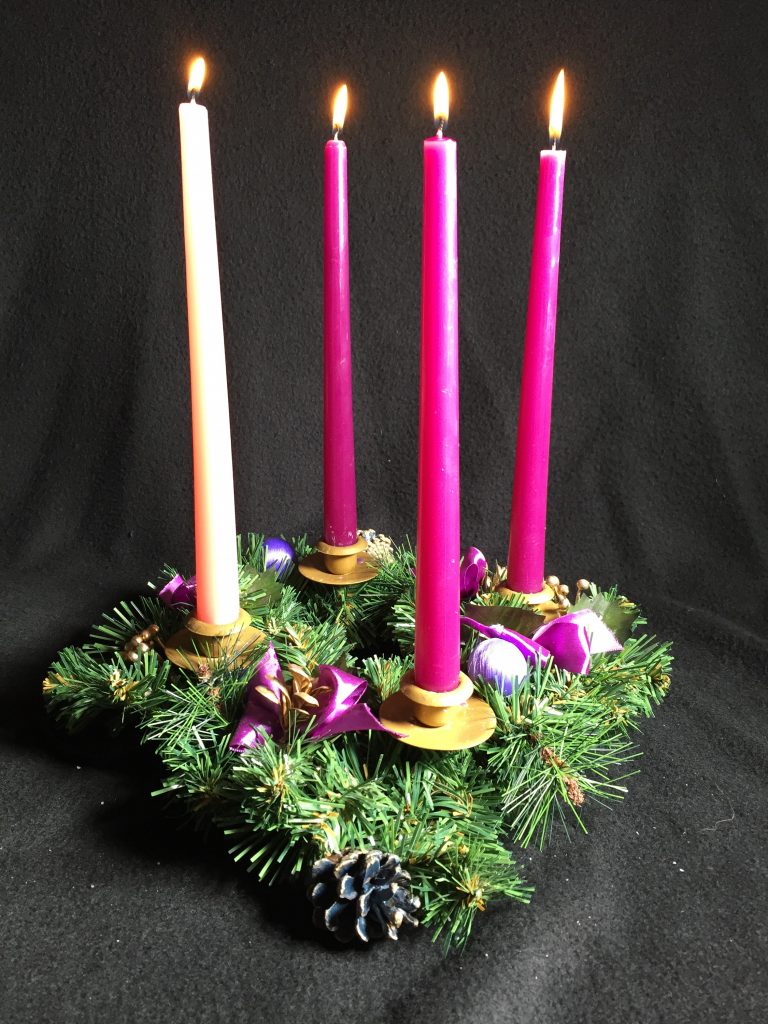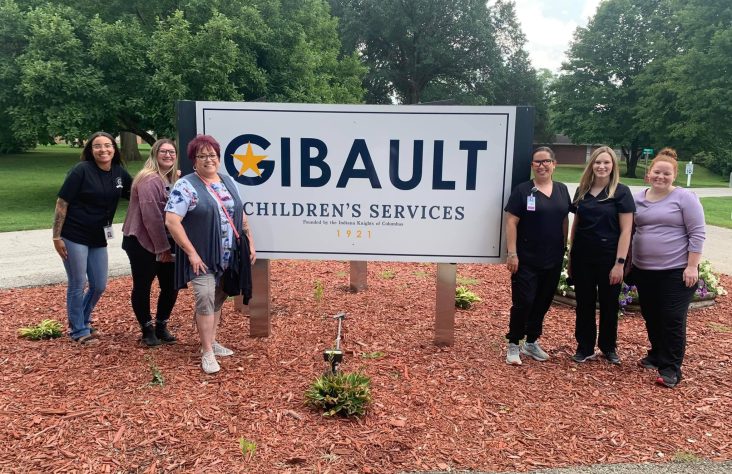November 27, 2019 // Diocese
First Sunday of Advent
Christ comes today and every day
As the season of Advent begins, the focus is on Christ’s first coming as a baby in Bethlehem over 2,000 years ago. During Advent, Christians also look forward to His second coming, in glory at the end of time. But He is also with us right now, in the present moment and in all of our joys and difficulties: He is with His children, as Pope Francis says, “today and every day.”
“Thank you for talking with me today. I really do appreciate that you didn’t judge me or make me feel bad for where I am. I didn’t choose to get pregnant, but I chose my baby and I will not feel bad for that. It’s easy for people to judge but harder to show compassion and understanding so thank you for that.”
The email landed in my inbox last fall, just hours after my first meeting with the young woman. She had been referred to me through our ministry, Miriam’s Blessing, which offers emotional, spiritual and practical support to anyone who receives a difficult prenatal diagnosis. The baby she was now carrying had been diagnosed with Trisomy 18, and since she had lost several other babies before birth, the mother was simply hoping to hold this little one in her arms for whatever time they would have together. As a single woman with multiple health issues herself and little support, she struggled to get by and was grateful that day for a listening ear.
We met every few weeks, talking about her hopes and fears for the baby beneath her heart, and made keepsakes in preparation for the possibility that this little one — like the siblings before her — would not live to see the light of day. When she was 30 weeks pregnant, labor began and her baby was born without a heartbeat. Her grief was devastating, and she began spiraling downward at a dizzying pace. I feared for her life and prayed that I could find a way to stanch the bleeding of her broken heart.
In March, just before the feast of the Annunciation, the Office of Family Life had its first Ava’s Grace retreat for anyone who had lost a baby before or after birth. I invited the woman to come, and she said she would. She had nothing to lose and would at least spend the day in the company of others who understood her unspeakable pain.
Toward the end of the retreat we had a half-hour of eucharistic adoration in the lovely little chapel. She was not Catholic and really did not know what to make of the white host in the middle of the monstrance.
For the first time in a long, long time, she opened her heart to God and poured out her pain. That day, in the Chapel of the Sacred Heart, she encountered the one whose own heart had been pierced by a lance, and who has come to bind up the broken-hearted. It was the beginning of her becoming a new creation in Christ.

The sequence of lighting the candles on an Advent wreath is to light the first purple candle on the first Sunday of Advent, which is Dec. 1 this year. Then move clockwise and light a second purple candle for the second Sunday of Advent, Dec. 8. On the third Sunday of Advent, Dec. 15, also known as Gaudete Sunday, the pink candle is lit. The last purple candle is lit on the fourth Sunday of Advent, Dec. 22. (CNS photo/Ann M. Augherton, Arlington Herald)
On the feast of the Annunciation a few days later, far away in Rome, Pope Francis wrote this in a letter, Christus Vivit, addressed to young people all around the world:
“Christ is alive! We need to keep reminding ourselves of this, because we can risk seeing Jesus Christ simply as a fine model from the distant past, as a memory, as someone who saved us two thousand years ago. But that would be of no use to us: it would leave us unchanged; it would not set us free. The one who fills us with his grace, the one who liberates us, transforms us, heals and consoles us is someone fully alive…. Because he did not only come in the past, but he comes to you today and every day, inviting you to set out towards ever new horizons.”
Christ comes to us in the Eucharist, whether we receive Him in holy Communion or simply spend time in His presence. The Church knows that the Lord comes even now in the Eucharist and that He is there in our midst. The Catechism of the Catholic Church reminds us of this.
Christ comes to us in the midst of our daily duties, waiting for us as He waited for the Samaritan woman at the well of Sychar. Like her, we have only to open our hearts to Him. As the Catechism points out in one of its most beautiful passages:
“The wonder of prayer is revealed beside the well where we come seeking water. There, Christ comes to meet every human being. It is he who first seeks us and asks us for a drink. Jesus thirsts; his asking arises from the depths of God’s desire for us. Whether we realize it or not, prayer is the encounter of God’s thirst with ours. God thirsts that we might thirst for him…Prayer is a response of love to the thirst of the only Son of God.”
Christ also comes to us, today and every day, in the “distressing disguise” of the poor, as St. Teresa of Kolkata often remarked. Her dear friend and fellow saint, Pope John Paul II, echoed this conviction in Novo Millennio Ineunte, a letter he wrote to the whole Church at the beginning of the new millennium:
“If we have truly started out anew from the contemplation of Christ, we must learn to see him especially in the faces of those with whom he himself wished to be identified: ‘I was hungry and you gave me food, I was thirsty and you gave me drink, I was a stranger and you welcomed me, I was naked and you clothed me, I was sick and you visited me, I was in prison and you came to me’ (Mt 25:35-37). This Gospel text is not a simple invitation to charity: it is a page of Christology which sheds a ray of light on the mystery of Christ. By these words, no less than by the orthodoxy of her doctrine, the Church measures her fidelity as the Bride of Christ.”
Christ comes to us in His Church, His mystical body, His beloved bride with whom He has become “one flesh,” and who like Him, desires to seek and to save what is lost. The tender mercy which Christ continues to extend through His Church is mysterious, and it can happen in through the manifold works of mercy that characterize the everyday life of the Christian community, and it can happen in miraculous ways.
Soon after the retreat, the young mother I had been mentoring asked if she could accompany me to daily Mass at a local parish, even though she could not receive Communion. We began staying afterwards to pray for a little while, and she started to reorient her whole life towards God and His plan for her life.
As new life was burgeoning in her soul, she discovered that there was new life blossoming once again in her body. She prayed that this baby, unlike all the others, would survive. Her pregnancy progressed without complication under the care of a Catholic physician, and at the same time she asked to begin the RCIA process to enter into the Church.
Well into her third trimester the baby’s growth slowed dramatically, and an ultrasound revealed that significant fluid had accumulated around her tiny heart. Given the seriousness of the condition, an appointment at Riley Children’s Hospital in Indy was arranged for the following week. An evening of healing prayer was being hosted at a local parish that Saturday evening, and I urged her to go and asked to be prayed over.
When the prayer team placed their hands upon her, she felt the baby move, like John the Baptist jumping for joy in his mother’s womb. When she went to Riley a few days later, the new scan showed that the baby’s heart was completely healed.
“Amen, amen I say to you, whoever believes in me will do the works that I do, and will do even greater ones than these, because I am going to the Father. And whatever you ask in my name, I will do, so that the Father may be glorified in me.” (John 14:12-13)
In a mysteriously beautiful manifestation of the mercy of Christ through the ministry of His Church, a mother’s heart has been healed, and so has her baby’s. And the due date of this little one is none other than Christmas Day.
The poet Rabindranath Tagore once wrote, “He comes, comes, ever comes.”
The best news. Delivered to your inbox.
Subscribe to our mailing list today.






